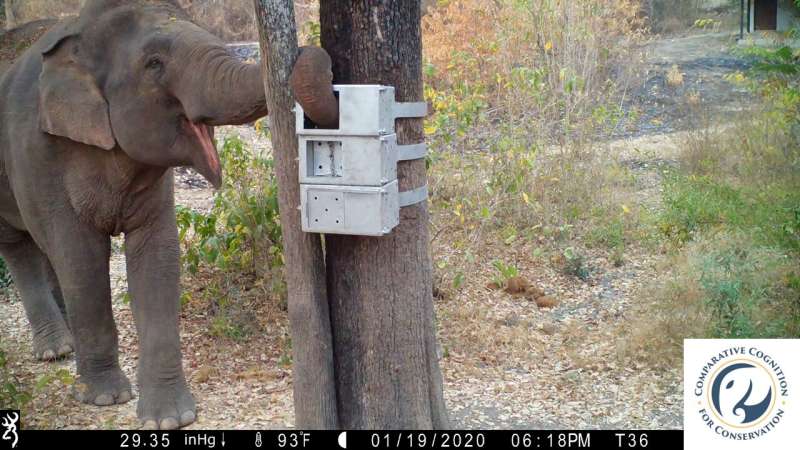This article has been reviewed according to Science X's editorial process and policies. Editors have highlighted the following attributes while ensuring the content's credibility:
fact-checked
peer-reviewed publication
trusted source
proofread
Wild Asian elephants display unique puzzle solving skills

Individual innovation is considered one sign of intelligence within species, and elephants are among the animals that researchers have long taken an interest in because of their sophisticated approach to problem solving. A newly published study in the journal Animal Behaviour details findings from a six-month-long study documenting the abilities of individual wild Asian elephants to access food by solving puzzles that unlocked storage boxes.
"This is the first research study to show that individual wild elephants have different willingness and abilities to problem solve in order to get food," said the study's lead author Sarah Jacobson, a psychology doctoral candidate studying animal cognition at the CUNY Graduate Center and Hunter College. "This is important knowledge, because how animals think and innovate may influence their ability to survive in environments that are rapidly changing due to human presence."
Conducted at the Salakpra Wildlife Sanctuary in Kanchanaburi, Thailand, the study used motion-activated cameras to observe 77 wild Asian elephants who approached and decided whether to attempt opening puzzle boxes with three differently configured compartments that contained highly aromatic jackfruit.
Depending on the compartment with which the elephant interacted, the jackfruit could be accessed by pulling on a chain so the door opened toward the elephant, pushing the door so that it swung open into the box, or sliding the door open to the right. The elephants had to independently interact with the puzzle boxes to discover how the compartments could be opened.
Over time, 44 of the elephants who approached the puzzle boxes interacted with them, but there were individual differences in how innovative the elephants were. The researchers found that elephants who interacted with the puzzle boxes more frequently and with greater persistence were more successful in retrieving food from all three differently configured compartments. Overall, 11 elephants solved one compartment type and eight solved two compartment types. Five elephants solved all three types, and therefore were the most innovative.
"Conflict involving humans and elephants is increasing due to loss of natural habitat and agricultural encroachment into what is left of it," said the study's principal investigator Dr. Joshua Plotnik, a psychology professor with the CUNY Graduate Center and Hunter College, and Sarah Jacobson's dissertation advisor. "Investigating innovation and problem solving in elephants can inform our understanding of wild elephant cognitive flexibility and its potential impact on conservation management and human-elephant conflict mitigation."
More information: Sarah L. Jacobson et al, Innovating to solve a novel puzzle: wild Asian elephants vary in their ability to problem solve, Animal Behaviour (2023). DOI: 10.1016/j.anbehav.2023.08.019
Journal information: Animal Behaviour
Provided by Graduate Center, CUNY
















